Hailan Ma
Learning Informative Latent Representation for Quantum State Tomography
Sep 30, 2023Abstract:Quantum state tomography (QST) is the process of reconstructing the complete state of a quantum system (mathematically described as a density matrix) through a series of different measurements. These measurements are performed on a number of identical copies of the quantum system, with outcomes gathered as frequencies. QST aims to recover the density matrix and the corresponding properties of the quantum state from the measured frequencies. Although an informationally complete set of measurements can specify quantum state accurately in an ideal scenario with a large number of identical copies, both measurements and identical copies are restricted and imperfect in practical scenarios, making QST highly ill-posed. The conventional QST methods usually assume adequate or accurate measured frequencies or rely on manually designed regularizers to handle the ill-posed reconstruction problem, suffering from limited applications in realistic scenarios. Recent advances in deep neural networks (DNNs) led to the emergence of deep learning (DL) in QST. However, existing DL-based QST approaches often employ generic DNN models that are not optimized for imperfect conditions of QST. In this paper, we propose a transformer-based autoencoder architecture tailored for QST with imperfect measurement data. Our method leverages a transformer-based encoder to extract an informative latent representation (ILR) from imperfect measurement data and employs a decoder to predict the quantum states based on the ILR. We anticipate that the high-dimensional ILR will capture more comprehensive information about quantum states. To achieve this, we conduct pre-training of the encoder using a pretext task that involves reconstructing high-quality frequencies from measured frequencies. Extensive simulations and experiments demonstrate the remarkable ability of the ILR in dealing with imperfect measurement data in QST.
Attention-Based Transformer Networks for Quantum State Tomography
May 09, 2023Abstract:Neural networks have been actively explored for quantum state tomography (QST) due to their favorable expressibility. To further enhance the efficiency of reconstructing quantum states, we explore the similarity between language modeling and quantum state tomography and propose an attention-based QST method that utilizes the Transformer network to capture the correlations between measured results from different measurements. Our method directly retrieves the density matrices of quantum states from measured statistics, with the assistance of an integrated loss function that helps minimize the difference between the actual states and the retrieved states. Then, we systematically trace different impacts within a bag of common training strategies involving various parameter adjustments on the attention-based QST method. Combining these techniques, we establish a robust baseline that can efficiently reconstruct pure and mixed quantum states. Furthermore, by comparing the performance of three popular neural network architectures (FCNs, CNNs, and Transformer), we demonstrate the remarkable expressiveness of attention in learning density matrices from measured statistics.
Auxiliary Task-based Deep Reinforcement Learning for Quantum Control
Feb 28, 2023



Abstract:Due to its property of not requiring prior knowledge of the environment, reinforcement learning has significant potential for quantum control problems. In this work, we investigate the effectiveness of continuous control policies based on deep deterministic policy gradient. To solve the sparse reward signal in quantum learning control problems, we propose an auxiliary task-based deep reinforcement learning (AT-DRL) for quantum control. In particular, we first design a guided reward function based on the fidelity of quantum states that enables incremental fidelity improvement. Then, we introduce the concept of an auxiliary task whose network shares parameters with the main network to predict the reward provided by the environment (called the main task). The auxiliary task learns synchronously with the main task, allowing one to select the most relevant features of the environment, thus aiding the agent in comprehending how to achieve the desired state. The numerical simulations demonstrate that the proposed AT-DRL can provide a solution to the sparse reward in quantum systems, and has great potential in designing control pulses that achieve efficient quantum state preparation.
Deep Reinforcement Learning with Quantum-inspired Experience Replay
Jan 06, 2021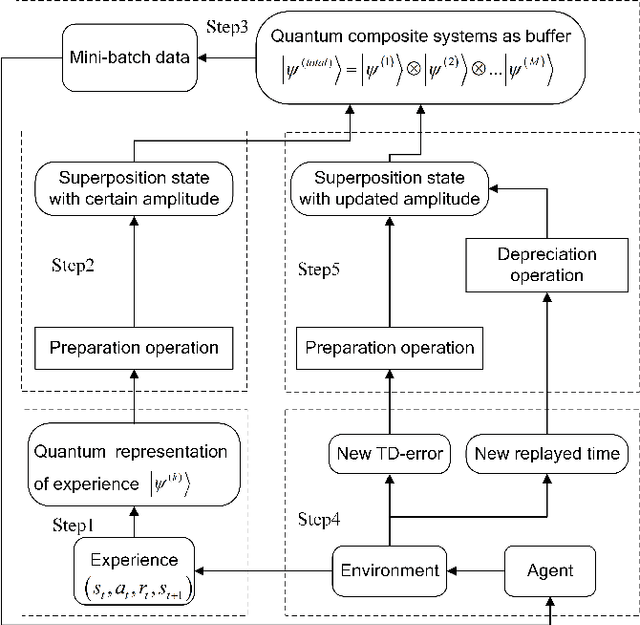
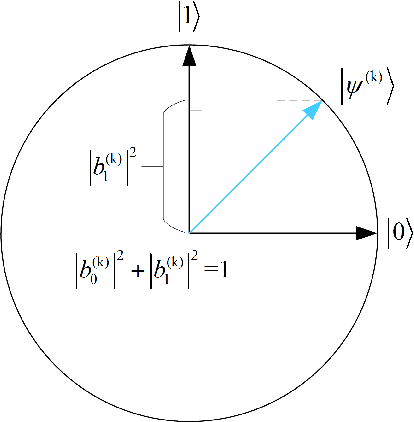
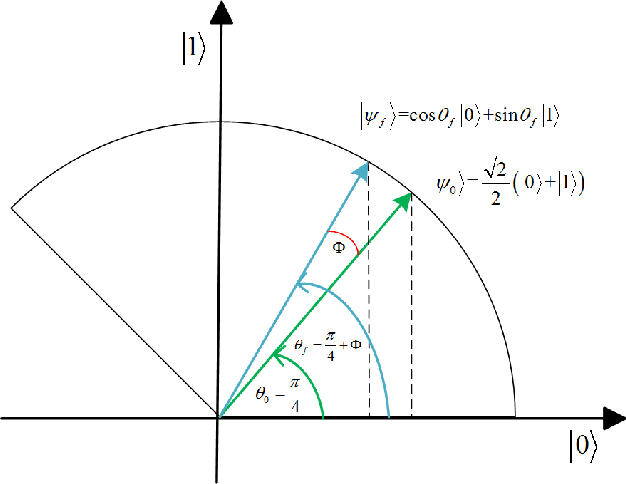
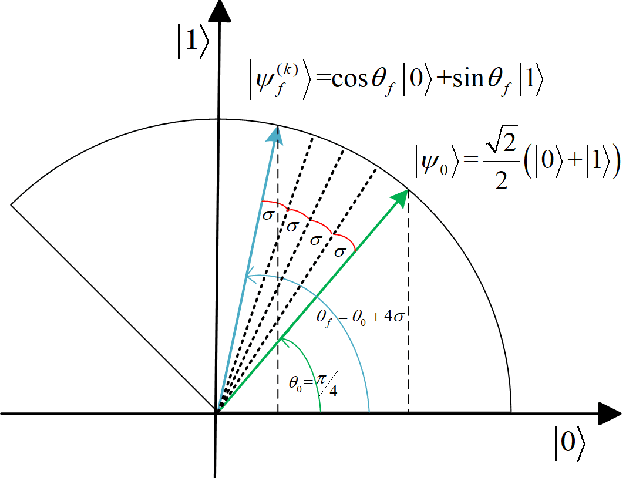
Abstract:In this paper, a novel training paradigm inspired by quantum computation is proposed for deep reinforcement learning (DRL) with experience replay. In contrast to traditional experience replay mechanism in DRL, the proposed deep reinforcement learning with quantum-inspired experience replay (DRL-QER) adaptively chooses experiences from the replay buffer according to the complexity and the replayed times of each experience (also called transition), to achieve a balance between exploration and exploitation. In DRL-QER, transitions are first formulated in quantum representations, and then the preparation operation and the depreciation operation are performed on the transitions. In this progress, the preparation operation reflects the relationship between the temporal difference errors (TD-errors) and the importance of the experiences, while the depreciation operation is taken into account to ensure the diversity of the transitions. The experimental results on Atari 2600 games show that DRL-QER outperforms state-of-the-art algorithms such as DRL-PER and DCRL on most of these games with improved training efficiency, and is also applicable to such memory-based DRL approaches as double network and dueling network.
Curriculum-based Deep Reinforcement Learning for Quantum Control
Jan 02, 2021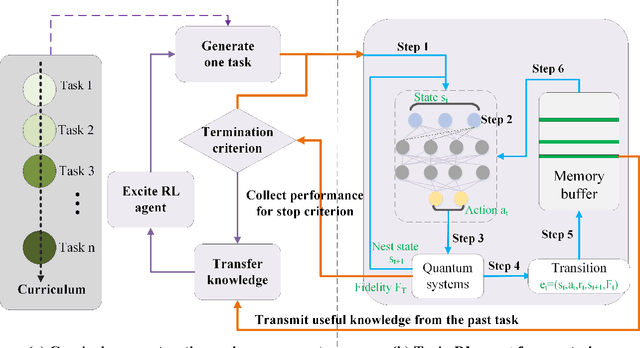
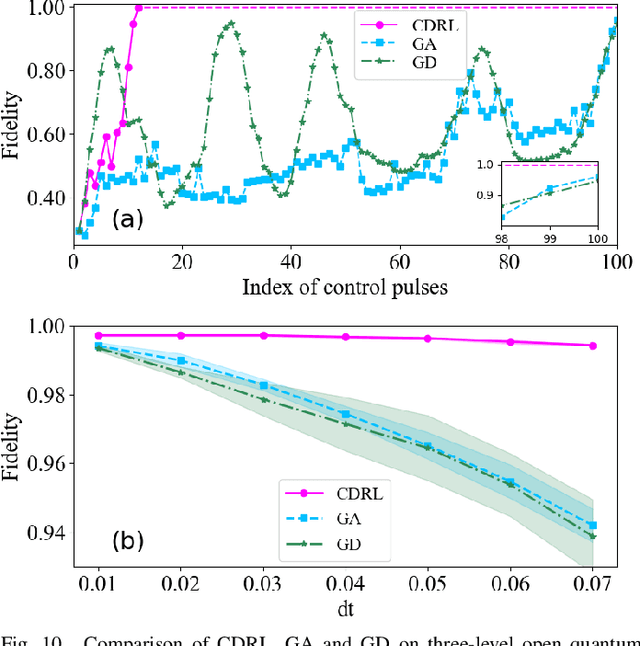


Abstract:Deep reinforcement learning has been recognized as an efficient technique to design optimal strategies for different complex systems without prior knowledge of the control landscape. To achieve a fast and precise control for quantum systems, we propose a novel deep reinforcement learning approach by constructing a curriculum consisting of a set of intermediate tasks defined by a fidelity threshold. Tasks among a curriculum can be statically determined using empirical knowledge or adaptively generated with the learning process. By transferring knowledge between two successive tasks and sequencing tasks according to their difficulties, the proposed curriculum-based deep reinforcement learning (CDRL) method enables the agent to focus on easy tasks in the early stage, then move onto difficult tasks, and eventually approaches the final task. Numerical simulations on closed quantum systems and open quantum systems demonstrate that the proposed method exhibits improved control performance for quantum systems and also provides an efficient way to identify optimal strategies with fewer control pulses.
On compression rate of quantum autoencoders: Control design, numerical and experimental realization
May 22, 2020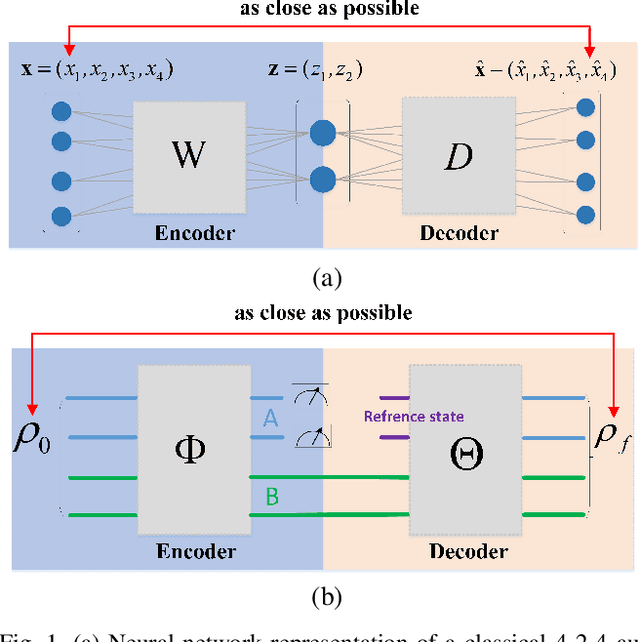
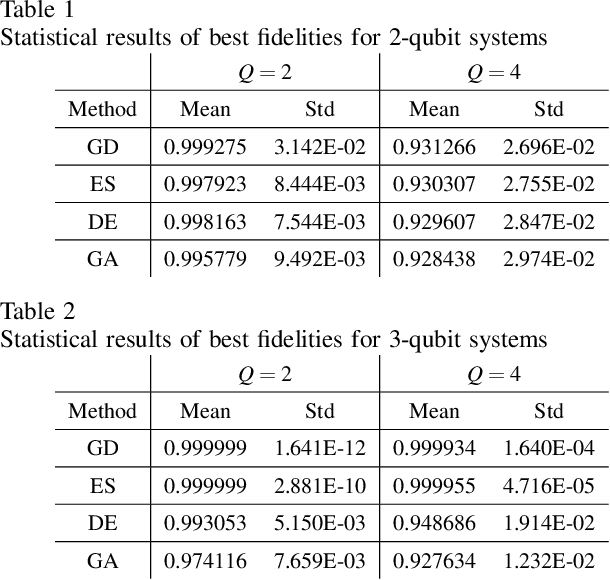
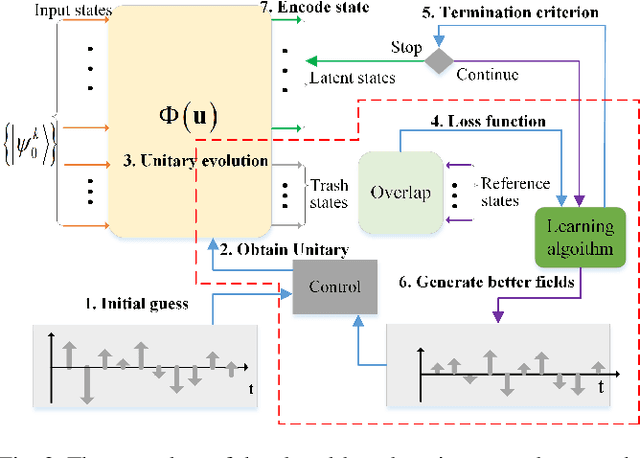
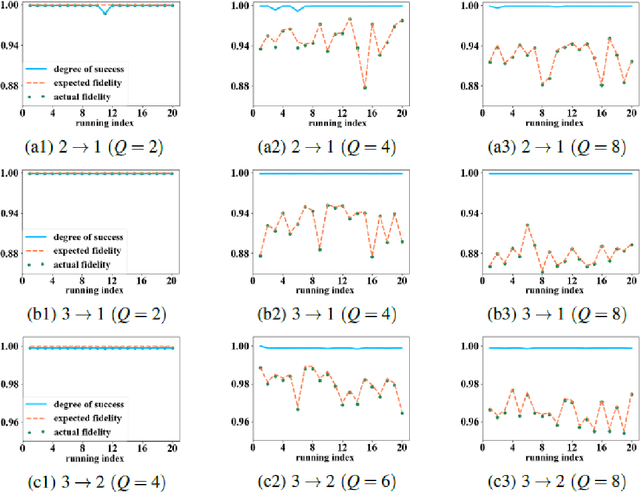
Abstract:Quantum autoencoders which aim at compressing quantum information in a low-dimensional latent space lie in the heart of automatic data compression in the field of quantum information. In this paper, we establish an upper bound of the compression rate for a given quantum autoencoder and present a learning control approach for training the autoencoder to achieve the maximal compression rate. The upper bound of the compression rate is theoretically proven using eigen-decomposition and matrix differentiation, which is determined by the eigenvalues of the density matrix representation of the input states. Numerical results on 2-qubit and 3-qubit systems are presented to demonstrate how to train the quantum autoencoder to achieve the theoretically maximal compression, and the training performance using different machine learning algorithms is compared. Experimental results of a quantum autoencoder using quantum optical systems are illustrated for compressing two 2-qubit states into two 1-qubit states.
Differential Evolution for Quantum Robust Control: Algorithm, Applications and Experiments
Feb 13, 2017


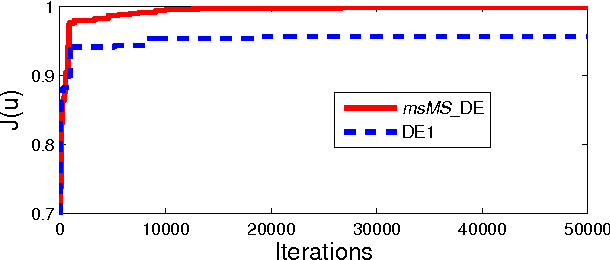
Abstract:Robust control design for quantum systems has been recognized as a key task in quantum information technology, molecular chemistry and atomic physics. In this paper, an improved differential evolution algorithm of msMS_DE is proposed to search robust fields for various quantum control problems. In msMS_DE, multiple samples are used for fitness evaluation and a mixed strategy is employed for mutation operation. In particular, the msMS_DE algorithm is applied to the control problem of open inhomogeneous quantum ensembles and the consensus problem of a quantum network with uncertainties. Numerical results are presented to demonstrate the excellent performance of the improved DE algorithm for these two classes of quantum robust control problems. Furthermore, msMS_DE is experimentally implemented on femtosecond laser control systems to generate good signals of two photon absorption and control fragmentation of halomethane molecules CH2BrI. Experimental results demonstrate excellent performance of msMS_DE in searching effective femtosecond laser pulses for various tasks.
 Add to Chrome
Add to Chrome Add to Firefox
Add to Firefox Add to Edge
Add to Edge